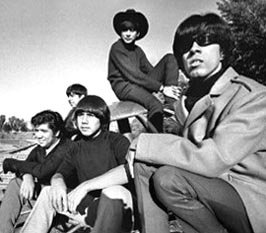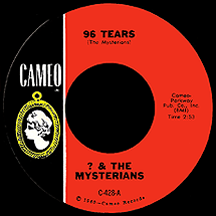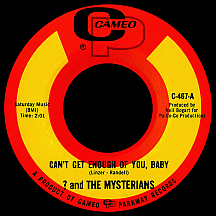? AND THE MYSTERIANS
96 Tears
The audacity! Someone chose to change his name to a question mark, of all things! Was it a ruse intended to keep him shrouded in mystery? Did anyone care? There was really no point in trying to decipher his identity, since it turned out he was no one famous. Except he became famous, but only as the squiggly symbol synonymous with the guy who fronted the group that made "96 Tears."
Before the enigmatic "?" came along, his future bandmates appeared to have created a smokescreen of their own, but that wasn't really the case. A Japanese sci-fi film, The Mysterians, directed by Ishiro Honda (previously responsible for the better-known Godzilla and Rodan), hit U.S. theaters in 1959, two years after its initial run overseas. It concerned a race of aliens from the planet Mysteroid: "Love-hungry spacemen come to seize our women that their dying race may live!" The invaders established "an impregnable fortress that hides in the Earth" and set loose a giant Godzilla-like robot monster called the Mogra to wreak havoc. Three years after all this mayhem was unleashed on American movie screens, four Latino teenagers living in Saginaw, Michigan, named their band The Mysterians, not with the intention of creating an air of ambiguity, but in honor of Honda's now-cult classic of cheesy cinematic special effects.
Guitarist Bobby Balderrama, bassist Larry Borjas and drummer Robert Martinez comprised the ranks of the high school group, formed in 1962, that held practice sessions the first year or so but little else. They played mostly rock and roll instrumentals until Robert's brother Rudy Martinez joined as lead singer in '64 (the brothers, born in Mexico, had lived in Texas before their family headed north). Rudy wore sunglasses all the time in an attempt to create a certain aura; his shades looked similar to those worn under the helmets of the movie Mysterians. At the suggestion of a local promoter, the band changed its name to XYZ for one or two live gigs, but the guys preferred the Mysterians name. Rudy's imagination ran wild with the XYZ idea and he decided to call himself Question Mark, using only the ? symbol (a curious concept predating Prince's unpronouncable symbol by more than 20 years).
Along the way, keyboard player Frank Rodriguez was added to the lineup. By 1965, Robert had been drafted into the U.S. Army and Larry had enlisted in same; Frank Lugo stepped in to play bass and Eddie Serrato (Robert and Rudy's brother-in-law) became the band's new drummer. They made many appearances between Saginaw and Detroit and gained a considerable following midway in the auto industry city of Flint. In early 1966 they recorded two songs at a Detroit studio, including Rudy's composition "I'll Be Back." Around that time the finishing touches were put on a song he had come up with a few years earlier called "Too Many Teardrops." Someone suggested mentioning a specific number of tears...say, 69, seeing as how they (and most teenagers) were fascinated with what the number stood for in sexual terms (when I found out the meaning, my reaction was, "Is that all?"); they realized radio stations might not play a song with that title, so they flipped the number around and "96 Tears" was on its way to becoming a rock classic.
Lilly Gonzales, a local businesswoman, became the group's manager and scheduled a date to record the song at a studio in nearby Bay City. Her brother-in-law, Rudy Gonzales, produced the March '66 session for "96 Tears" with Rodriguez's repetitiously satisfying organ riff that would soon be imitated by obscure bands across the land. Another of Rudy's songs, "Midnight Hour," was recorded the same day. Lilly had several hundred copies pressed on a small label owned by her husband, Joe "Pato" Gonzales. It was a small operation based in Saginaw with a San Antonio office that was no more than a room in a family member's house; the first single on the Go-Go label had been by a Lone Star Latino band, Danny and the Tejanos. With the next release by ? (Question Mark) and the Mysterians, the label's name was permanently changed to Pa-Go-Go ("Pa" for Pato, or "duck" in English, "Go" for Gonzales). Lilly felt that "Midnight Hour" stood the best chance of making it, but the Mysterians preferred the other side. The five went into self-promotion mode, making the rounds of radio stations and record shops.
WTAC, in the band's stomping grounds of Flint, Michigan, recognized the rough-around-the-edges brilliance of "96 Tears," moving it quickly into heavy rotation based on enthusiastic listener reaction; stations in Saginaw and a few Texas cities added the single at about the same time. When CKLW in Windsor, Ontario (serving Detroit, then the fifth largest U.S. market) came on board, Neil Bogart, a recently-hired executive for the once mighty but struggling Cameo-Parkway Records, dealt directly with Lilly and sealed the deal for national distribution on Cameo. The record broke in late August of '66 and hit number one at the end of October; a week later, the rapidly-selling 45 was certified by the RIAA for one million in sales. Other artists caught the fever; in January, R&B great Big Maybelle hit the charts with a hot, soulful cover of "96 Tears."

The band recorded an album titled after the hit, chock full of punky, funky, bluesy rock with a splash of Tex-Mex influence in a no-frills garage rock structure. At at time when many bands were still filling their albums with inferior versions of established hits, all but one of the 12 tracks on the ? and the Mysterians longplay were original songs. "I Need Somebody" (also written by Rudy, who insisted on being called "Question Mark" at all times) came on the heels of "96 Tears." Rocking a bit harder with Frank's organ lead (strangely employing a "Mary Had a Little Lamb" riff, a trick Stevie Wonder had used on his chart-topping "Fingertips" in 1963 and The Bar-Kays would brassily funkify on their hit "Soul Finger" a few months later), it was a solid top 30 hit in December. "Can't Get Enough of You, Baby," a Sandy Linzer-Denny Randell composition, modified the "96 Tears" formula and made its mark in the spring of '67. Somewhere along the way Rudy had his name legally changed to ?, or so he claimed.
Next the band put out an instrumental single as The Semi-Colons?, a remake of Bobby Darin's "Beachcomber," followed by another puzzling release as The Fun Sons, "Hang Ten." It appears Bogart had been greenlighting the release of these studio recordings/outtakes under different names as Cameo-Parkway continued having financial difficulties (odd considering the company had recently scored a million-selling hit). Bogart pressured them to record songs penned by outside sources for single release. Another album, Action, hit the streets and a new ?+M single, the assuredly psychedelic "Girl (You Captivate Me)" (written by Joey DiFrancesco and Alan Dischel) charted in June but disappeared after a couple of weeks. After that, "Do Something To Me," a Jimmy Calvert-Norman Marzano-Paul Naumann song produced by Jimmy Wisner, fared poorly (but was a fair-sized hit for Tommy James and the Shondells a year later). Then, suddenly, Cameo-Parkway was out of business.
Capitol Records gave the group a shot, putting a big effort into promoting "Make You Mine" in the spring of 1968, but it faltered, though stations in Flint, Michigan, Mysterian supporters from the beginning, played the record. A one-shot produced by Frank Slay for the Chicory label, "Talk is Cheap," followed. Bogart started Buddah Records, focusing on bubblegum artists; he successfully transitioned The Ohio Express from garage rock to bubblegum, then signed ? and the Mysterians, though only one 45 appeared on subsidiary Super K, a short-lived enterprise for producers Jerry Kasenetz and Jeff Katz.
Other records were released sporadically during the next few years (including one on Ray Charles' Tangerine label) to no avail, though live shows were impressive. The Mysterians split up but reunions have occurred in successive decades with varying members, the spotlight occasionally shining on the man behind the Ray-Bans, Rudy Martinez, and his unique band from Saginaw. All the while a gigantic Question Mark hangs over our heads and rests on everyone's lips. Rudy is pleased that his name comes up so often in conversation.



